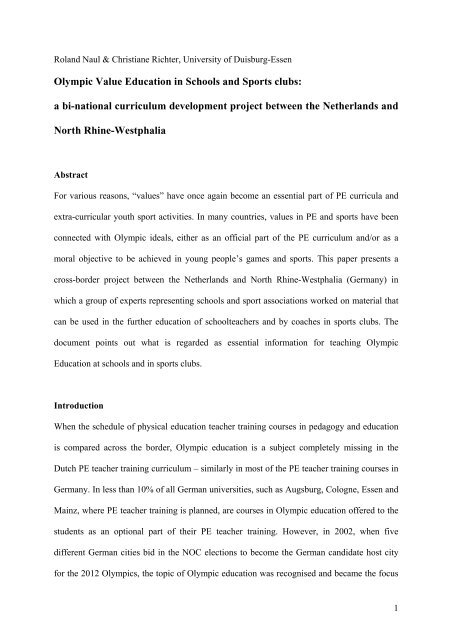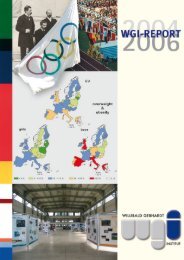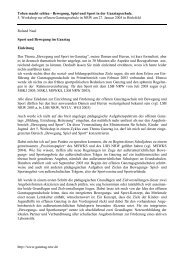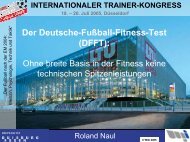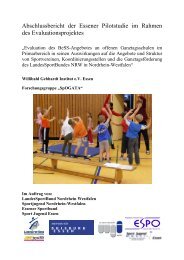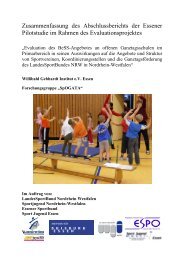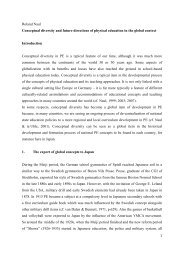Christiane Völz - Willibald Gebhardt Institut
Christiane Völz - Willibald Gebhardt Institut
Christiane Völz - Willibald Gebhardt Institut
Create successful ePaper yourself
Turn your PDF publications into a flip-book with our unique Google optimized e-Paper software.
Roland Naul & <strong>Christiane</strong> Richter, University of Duisburg-Essen<br />
Olympic Value Education in Schools and Sports clubs:<br />
a bi-national curriculum development project between the Netherlands and<br />
North Rhine-Westphalia<br />
Abstract<br />
For various reasons, “values” have once again become an essential part of PE curricula and<br />
extra-curricular youth sport activities. In many countries, values in PE and sports have been<br />
connected with Olympic ideals, either as an official part of the PE curriculum and/or as a<br />
moral objective to be achieved in young people’s games and sports. This paper presents a<br />
cross-border project between the Netherlands and North Rhine-Westphalia (Germany) in<br />
which a group of experts representing schools and sport associations worked on material that<br />
can be used in the further education of schoolteachers and by coaches in sports clubs. The<br />
document points out what is regarded as essential information for teaching Olympic<br />
Education at schools and in sports clubs.<br />
Introduction<br />
When the schedule of physical education teacher training courses in pedagogy and education<br />
is compared across the border, Olympic education is a subject completely missing in the<br />
Dutch PE teacher training curriculum – similarly in most of the PE teacher training courses in<br />
Germany. In less than 10% of all German universities, such as Augsburg, Cologne, Essen and<br />
Mainz, where PE teacher training is planned, are courses in Olympic education offered to the<br />
students as an optional part of their PE teacher training. However, in 2002, when five<br />
different German cities bid in the NOC elections to become the German candidate host city<br />
for the 2012 Olympics, the topic of Olympic education was recognised and became the focus<br />
1
of the submitted bid for the city of Düsseldorf. The “White Book of Olympic Education”<br />
(Düsseldorf Rhein-Ruhr 2012 GmbH, 2002) spelled out an educational, cultural and social<br />
programme for a “decade of Olympic education” in schools and sports clubs. A further step in<br />
promoting Olympic education in the Netherlands and Germany was raised in the EU-Year<br />
2004, with the “Education through Sport” campaign (cf. Janssens et.al., 2004, Tokarski &<br />
Petry, 2006). Both campaigns focused on the topic of Olympic education and its values and<br />
virtues in sports and physical activities.<br />
The background of our German-Dutch cross-border project in Olympic education is closely<br />
linked with both of these 2002 and 2004 activities. The second Dutch-German Symposium for<br />
PE, co-organized by the <strong>Willibald</strong> <strong>Gebhardt</strong> Research <strong>Institut</strong>e (WGI, Essen, Germany) in<br />
2003, focused on the topic of Olympic education designed in the ‘White Book’. This<br />
symposium on Olympic education was very successful and brought together the departments<br />
of Olympic education in the Dutch and German National Olympic Committees. As one<br />
outcome of the meeting, our research institute (WGI) started the cross-border project on<br />
Olympic education in the autumn of 2004 with the support of the EUREGIO Rhein Waal,<br />
which is a cross-border region in the north of Germany and the Netherlands, the European<br />
Academy of Sports (EAdS), based at Velen (North Rhine-Westphalia), and also the support of<br />
our Ministry of Sports in North Rhine-Westphalia (MSWKS), the PE department of the State<br />
Curriculum <strong>Institut</strong>e (LfS), the State Sport Federation of North Rhine-Westphalia (LSB<br />
NRW) and the Dutch PE Teacher organization (KVLO).<br />
Purpose of the project<br />
Each partner and supporter of the project participated with a delegate in this project. Team<br />
members of the working groups have been along with the two authors of this article, Bert<br />
Boetes (KVLO), Rolf Geßmann (German Sport University Cologne) and Roland Grabs (LSB<br />
2
NRW). Important objectives of the projects were proposed by the working group and<br />
discussed, modified and finally agreed by a steering group. Both groups are represented by<br />
German and Dutch scientists, teachers and representatives of the institutions who sponsor and<br />
support the project. Major targets of the projects are:<br />
To convey knowledge about the Olympic movement in general (criteria of ancient and<br />
modern times, phases of development in modern times, ceremonies, symbols, technical<br />
development, boycotts, “cold war politics”, etc.) and national items in particular<br />
(participation, hosting games, national sport profiles, outstanding athletes, cross-cultural<br />
contests in the Games, etc.). In addition, information should be given about the IOC<br />
Charter and the ambiguous assessments of the appearance of the Olympic Games in<br />
public life.<br />
To convey the educational purpose of the IOC Charter, and to highlight the development<br />
and structure of different international and national teaching approaches to Olympic<br />
education, together with a representative collection of writings, including examples of<br />
methods of instruction.<br />
Finally, to document for both teaching in schools, and coaching in sports clubs, a<br />
complete practical teaching guide for each setting (schools and clubs) which provides a<br />
range of sample lessons or units of teaching and coaching up to a whole course of<br />
teaching/coaching at schools/sports clubs, including a variety of “Olympic events” (e.g.<br />
contests, ceremonies, Olympic weeks/week-ends etc.), both in a single school subject<br />
(PE) and interdisciplinary (in at least two subjects) as well as in single sports and as a<br />
special triathlon or pentathlon involving a variety of physical activities (sports clubs).<br />
3
Schedule of the project<br />
The project schedule was structured into four stages (2004-2006):<br />
1. A collection of written materials in Dutch and German on Olympic education at school and<br />
in sports clubs including “best practise” examples (Sept. 2004-Nov.2004).<br />
2. Development of a module system which fits into the different school and sports club<br />
systems as well as the bi-national systems of PE teacher training. Providing a manual and a<br />
complete set of teaching materials for training PE teachers and sports coaches in Olympic<br />
education (Dec. 2004-July 2005).<br />
3. Implementation of the teaching materials at two PE teacher conferences (one in each<br />
country) and at two sports coach conferences (one in each country). Feed back of experienced<br />
PE teachers and sports coaches who are involved in further education campaigns in their<br />
professional sectors (schools, sports clubs) (Aug. 2005-Oct. 2005).<br />
4. Documentation of the final draft of the teaching materials in hard copy as a book (cf. Naul<br />
et. al., 2006) and as an electronic file on the webpage of the project<br />
(www.olympischeerziehung.de) (Dec. 2005-Feb.2006).<br />
Methods<br />
External and Internal Structure of the Module System<br />
According to the purposes of the project to familiarize teachers and coaches with the Olympic<br />
idea, to pass basic knowledge about the international Olympic movement in the Dutch and<br />
German contexts to them, and to help them learn about and apply different approaches to<br />
Olympic education to teaching in schools and coaching in sports clubs, the working group<br />
designed a tripartite module system for the cross-border teaching of Olympic Education:<br />
4
Module 1:<br />
Module 1 (M1) documents a range of teaching units which give a brief introduction to the<br />
history of the Olympic Games viewed from Dutch and German national perspectives and<br />
compares the two national developments in the context of international items (e.g. the<br />
beginning of the national Olympic movement, participation and boycotts, hosting the Games<br />
in 1928, 1936 and 1972; cold war politics and the so called “German question”). The criteria<br />
of ancient and modern Olympic Games from an ethical-moral background (such as fair play)<br />
are documented, as well as the IOC Charter with its paragraphs on fundamental principles<br />
about ceremonies, symbols, etc., convergences and divergences (in the context of summer and<br />
winter games; participation in and boycotts of Olympic Games) in many respects (the range<br />
of sports, national contests within the Olympics e.g. skating, cycling, hockey, etc) highlight<br />
and compare the two national heritages of the Olympic movements in the Netherlands and<br />
Germany. In addition, examples of alternative assessments of the Olympic Games (e.g. from<br />
the origins of de Coubertin to the post-modern critics of Jennings) give some insight into the<br />
different perspectives of the Olympic Games which exist today.<br />
Module 2:<br />
Module 2 (M 2) covers a range of teaching units, which give a full insight into matters of<br />
Olympic education. The educational purposes of the IOC Charter (fundamental principles) are<br />
highlighted as a common cross-border pedagogical demand for Olympic education<br />
programmes. With a historical background of socio-moral reasoning in PE and the coaching<br />
of youth sports, it documents four major concepts of teaching approaches in Olympic<br />
education, with a selection of basic writings about the respective concepts for teaching<br />
Olympic education. Furthermore, information is available about the teaching of special items<br />
like fair play, mutual understanding, joy in effort, etc.<br />
5
Module 3:<br />
Module 3 (M 3) provides two sections of teaching material for Olympic education units in<br />
schools and in sports clubs. Each section includes a set of examples given as work sheets,<br />
lesson schedules, preparation outlines for lessons/sessions, including teachers’ and coaches’<br />
reports on how to conduct Olympic education for a range of different “Olympic events” inside<br />
and outside schools and sports clubs.<br />
Modules 1 and 2 may be considered as two practical text books on the Olympic movement<br />
and Olympic education, whereas module 3 is a guide for teachers and coaches with examples<br />
of how to prepare and conduct practical lessons and incentives in Olympic education.<br />
M 1<br />
Olympic Games - knowing the<br />
event, understanding its idea and<br />
history<br />
♦<br />
Pedagogic-didactical foundation of<br />
Olympic Education<br />
M 2 School Sports Club<br />
M 3<br />
M 4<br />
M 5<br />
Selected<br />
approaches<br />
Selected<br />
approaches<br />
↕<br />
Areas for Olympic sports practise<br />
Young people<br />
Primary school<br />
from different age<br />
groups in sports<br />
Secondary school<br />
clubs<br />
Bibliography on Olympic<br />
Education<br />
Planning and working with the<br />
materials<br />
Fig. 1. External structure of the module system<br />
Some common criteria for the internal structure of each of the three modules and each part of<br />
a module were set up. Each heading of one part of a module was directly followed by a<br />
didactic commentary which draws attention to the purpose of this part of the module and the<br />
6
selected text document given to read and to study. To compare, for example, the meaning and<br />
intention of the ancient Olympic Games, with the idea which Pierre de Coubertin had in mind<br />
when he and his friends established the modern type of Olympic games, a commentary was<br />
given like this:<br />
The function of this module is to show the differences between the ancient and modern Olympic games on the basis of typical features of<br />
the games relating to aims, programme and implementation. This applies especially to the various pedagogical and ethico-moral principles<br />
that were so important to Coubertin when he revived the Olympic games under the conditions pertaining at the end of the 19th century.<br />
Figure 2: Didactic commentary<br />
After a selected text at least one assignment was given in a “grey box” with advice on how to<br />
carry it out correctly.<br />
Find continuities and discontinuities between the years and try to explain them. Information from modules 1/2.1 and 2.2 may help.<br />
Fig. 3: Internal Structure of the Module System<br />
In summary: M 1 lays a selected historical foundation of the Olympic movement, focussing<br />
and comparing the two national histories of Germany and the Netherlands. M 2 is the<br />
pedagogical and educational foundation of the purpose and approaches to Olympic education,<br />
focussing on the educational aims and teaching value of Olympic education both in schools<br />
and within sports clubs. Some Dutch sources, such as sports club activities, were translated<br />
into German because of the lack of similar work packages. M 3 is a comprehensive guide of<br />
teaching materials to prepare and conduct lessons, events, and incentives including work<br />
sheets. In order to give more insight into the structure of a module we will go through M 2<br />
and show examples from each part of this module.<br />
Module 2: Olympic education<br />
The module on Olympic education is subdivided into four parts:<br />
7
2.1: Olympic education: Pro and Contra<br />
2.2: Historical background of Olympic education in the Netherlands and Germany<br />
2.3: Concepts of Olympic education<br />
2.4: Approaches to Olympic education in sports clubs<br />
Module 2.1: Olympic education: Pro and contra<br />
The starting-point of our second module was the question: What importance do the Olympic<br />
games have for Olympic education?<br />
When, in 1992, the city of Berlin bid to host the Olympic Games 2000, public opinion was<br />
split about the sense and non-sense of the Olympic Games. And there are still a lot of people<br />
who have in mind the Coca-Cola Games in Atlanta 1996 and think of doping, commerce,<br />
corruption and media when talking about Olympic Games (cf. Timmers & de Knop, 2000;<br />
Willimczik, 2002). When we consider these aspects it is understandable that quite a few<br />
teachers, coaches, head teachers and education politicians are sceptical about the term<br />
“Olympic” and do not want to have anything like Olympic education in their schools and<br />
sports clubs. But, as is shown in Module 1, the term “Olympic education” neither refers to<br />
training for participation in Olympic games nor to knowledge about the Olympics. The<br />
fundamental principles of the Olympic Charter are basically aimed at personal, and especially<br />
social and moral values, which are strived for within the framework of an Olympic education.<br />
Obviously, there is a certain tension between the Olympic idea (the fundamental principles)<br />
and the reality of the Olympic Games. This ambivalence is seen by Dutch people (cf.<br />
Timmers & de Knop, 2000) as well as by German teachers of physical education (cf.<br />
Willimczik, 2002). The Dutch study that was implemented on behalf of the NOC*NSF,<br />
surveyed 3,500 people of ages 15-65. The questions they were asked included giving their<br />
opinion of the five most important reasons why athletes take part in the Olympic games.<br />
8
“Money” and “Improvement of the athlete’s image” were found in 2 nd and 4 th place. “Giving a<br />
good example” and “a sound mind in a healthy body” were estimated respectively as the 1 st<br />
and 3 rd motivation (cf. Timmers & de Knop, 2000). A similar ambivalence between the<br />
fundamental principles and the reality of the games is seen by German teachers of physical<br />
education. Their answers to the question about the aims of Olympic education were “value<br />
education”, “fair play”, “communication between peoples”, “respect” and “competition”.<br />
Apart from these positive answers, about 60% of these teachers referred to the gigantism of<br />
the Olympic Games and their distance from the Olympic ideals (cf. Willimczik, 2000).<br />
The criticism of the Olympic Games and their gigantism is one aspect which is often named<br />
in relation to view to the term “Olympic”; the distance of the reality of the games from the<br />
positive Olympic ideals is another. These ideals have their own pedagogical quality which is<br />
fundamentally independent of this contradiction. Thinking of Pierre de Coubertin and his idea<br />
of Olympism we can say: The pedagogical aims were first, the games came later. To<br />
demonstrate this ambivalence and to point out the pedagogical implication of the Olympic<br />
movement after Coubertin, we chose a text written by Naul (2002) for this project, which<br />
shows the different positions.<br />
The second part of module 2 refers to the historical background of Olympic education in<br />
Germany and the Netherlands.<br />
Module 2.2: Historical background of Olympic education in the Netherlands and Germany<br />
In Germany, the first signs of Olympic education in schools can be found in the 1980s. The<br />
National Olympic Committee for Germany (NOK) started to publish booklets about Olympic<br />
education in schools in 1988 (see the last brochures 1997, 2000, 2001). Recently, Michael<br />
Krüger (2003) pointed out that there are no references in literature to Olympic education in<br />
German sport pedagogy and the sport didactics in the 1970s and 1980s. Discussions about the<br />
9
inclusion and the use of Olympic education in physical education in schools, began in the<br />
1990s. It was Ommo Grupe who first thought about a revival of the pedagogical potential of<br />
sports and thus introduced the idea of Olympic education (see below).<br />
In module 2.3 different approaches are offered for Olympic education in Germany.<br />
2.3: Concepts of Olympic education<br />
Generally, the constitutional foundation of Olympic education is the Olympic Charter. The<br />
Charter is the world-wide central base for the pedagogic approach to Olympism. But this<br />
approach is more dominant in English-speaking regions of the world (Australia, Canada, New<br />
Zealand, USA) (Naul, 2004a) and are therefore not discussed in this paper.<br />
A second important foundation is often taken into account when tasks and targets for Olympic<br />
education are considered: the writings of Pierre de Coubertin and his Pedagogie sportive<br />
(1928). This foundation is very popular in Germany. It was laid down by philosophers,<br />
pedagogues and sociologists like Lenk (1964) and Müller (1975) who interpreted the classical<br />
writings of Pierre de Coubertin. Carl Diem also promoted Olympic education by analysing<br />
and interpreting the role of the games and sport for moral values and social virtues as a means<br />
of a contribution to a balanced body and soul (cf. Diem, 1967).<br />
Since the early 1990s, Ommo Grupe has become the most important sports pedagogue who<br />
promotes Olympic pedagogy. According to Grupe (1997, 2000, 2001) there are basically five<br />
principles of Olympic pedagogy:<br />
1. “the principle of unity of body and soul, aimed at harmonious learning and holistic<br />
education;<br />
2. the aim of individual self-fulfilment: “working for sporting ability” and “path to a better<br />
self”;<br />
10
3. the ideal of amateurism as “training of virtue by means of worldly asceticism” with the<br />
aim of becoming immune to greed and materialism;<br />
4. the ethical rules and principles of honesty and fairness; and<br />
5. the task of promoting mutual respect between people and nations, with the peacemaking<br />
idea of the principles of sporting performance and competition” (cf. Naul, 2004a, p. 25).<br />
Norbert Müller (1998) added a sixth principle:<br />
6. “The promotion of emancipatory developments in and through sport (…) [which include]<br />
the acceptance of all different forms of physical activities and competitive sport” (p. 393).<br />
In Germany there are four major approaches to teaching Olympic education.<br />
(1) The most popular approach is a “knowledge-oriented approach” conveying<br />
information about ancient and modern Olympic Games.<br />
(2) The second approach is practically oriented. It is called the “experimental approach”<br />
where school Olympic festivals and sports days are in the foreground.<br />
(3) The third approach is named the “physical striving approach”. Here the individual<br />
development through physical competition with others is seen as the most important.<br />
This approach is linked to Geßmann (2002) in whose opinion “individual sporting<br />
perfection is the basis for the individual through concentrated and systematic exercise<br />
and training” (p. 16).<br />
(4) The fourth approach comes from Canada and is almost unknown in Germany. In this<br />
“lifeworld-oriented approach” Olympic education is integrated with learning<br />
activities in all aspects of school curricula, including physical education (for more<br />
details see Binder, 2000).<br />
Each approach for teaching Olympic education is linked with special Olympic principles and<br />
ideals. The lifeworld-oriented approach probably seems to be the most appropriate one for<br />
11
current demands in physical education classes (Naul, 2004a). However, with a view of<br />
modern Olympic Games and modern society an integrated concept is needed which combines<br />
the educational tasks with modern manifestations in society (Naul, 2003).<br />
Naul (2002, 2003, 2004a) developed an integrated concept. This concept is also based on the<br />
two foundations mentioned above (“Fundamental Principles” of the Olympic Charter and the<br />
"historical-pedagogical foundation" as a revival of the idea of Pierre de Coubertin), but also<br />
includes a third foundation: current lifestyles and social environment.<br />
Figure .3: Integrated concept of Olympic education (Naul, 2002)<br />
These three foundations build up the frame defining aims and targets of Olympic education.<br />
“The integrated concept of Olympic Education picks up the special educational tasks of the<br />
single teaching approaches. The main purpose of the integrated concept is: individual<br />
development of sports skills, social virtues and moral values = ‘Olympic living’ (Naul, 2004a,<br />
p. 28f.).<br />
12
According to Naul (2004a) the integrated concept of Olympic education “should encourage<br />
individual physical performance by means of achieving, improving and competing and should<br />
develop positive value judgements from this” (p. 29). In sport activities young people should<br />
experience ethical principles and should get knowledge about moral aspects for an ethical and<br />
moral behaviour in sport.<br />
For our project we decided to start with extracts from texts by Pierre de Coubertin. After the<br />
historical introduction by Grupe (1997), Naul (2004b) and Geßmann (2002), we will give an<br />
overview of the foundations and concepts of Olympic education. For additional reading there<br />
will be an appendix with texts by Binder (2004) and Müller (2004).<br />
M 2.4 Approaches to Olympic education for Sports clubs<br />
In Germany and also in the Netherlands there is no real concept of Olympic education in<br />
sports clubs yet. The only approach is done by Grabs (2004), but this will be changed during<br />
the course of the project and is ignored here. In the Netherlands, on the other hand, there are<br />
quite a number of good examples for practice (e.g. Fair Play and Respect in Soccer). They are<br />
practice-oriented examples of how to work in sports clubs and at school.<br />
Conclusion<br />
The cross-border project for Olympic education in the Netherlands and in Germany has been<br />
finished with the publication of a book and all modules are available in German on our<br />
website. The Dutch language version is not available at present but is being discussed. All the<br />
material is completed, but after more teaching experience on both sides of the border the texts<br />
may need some revision. At the time of writing we can say that the intention of Olympic<br />
education, published booklets and brochures including work sheets, which already exist in the<br />
Netherlands for Olympic education, are much more practice-oriented and principally suitable<br />
for sports club activities, whereas those from Germany convey a more conceptual and<br />
13
theoretical base for teaching Olympic values and items in lessons at school and in teaching<br />
PE. Together, these two aspects give a useful foundation for successful training for Olympic<br />
education which links both children’s physical activity levels and their experiences of values in<br />
education and sport, at school and within sports clubs.<br />
References<br />
Binder, D. (2000). Be a Champion in Life! Athens: FOSE.<br />
Binder, D. (2004). Teaching Olympics in Schools: Olympic Education as a focus on Values<br />
Education. http://olympicstudies.uab.es/lectures.<br />
Coubertin, P. de (1928). Sportliche Erziehung. Stuttgart: Dieck & Co.<br />
Diem, C. (1967). Der Olympische Gedanke. Reden und Aufsätze. Edited by Carl-Diem-<br />
<strong>Institut</strong>. Schorndorf: Hofmann.<br />
Düsseldorf Rhein-Ruhr 2012 GmbH (Ed.). (2002). Weißbuch Olympische Erziehung.<br />
Düsseldorf: drr.<br />
Geßmann, R. (2002). Olympische Erziehung in der Schule: Zentrale und Peripheres.<br />
Sportunterricht, 51, 16-20.<br />
Grabs, R. (2004). Olympische Bildung und Erziehung im Sportverein. Betrifft Sport, 26 (4),<br />
27-29.<br />
Grupe, O. (1997). Olympismus und olympische Erziehung. Abschied von einer großen Idee?<br />
In O. Grupe (Ed.), Olympischer Sport – Rückblick und Perspektiven (pp. 223-243).<br />
Schorndorf: Hofmann.<br />
Grupe, O. (2000). Vom Sinn des Sports. Schorndorf: Hofmann.<br />
Grupe, O. (2001). Gibt es ein Leitbild des Olympischen Sports? In M. Krüger (Ed.),<br />
Olympische Spiele. Bilanzen und Perspektiven (pp. 58-73). Münster: Lit.<br />
Krüger, M. (2003). Olympismus und Sportpädagogik in Deutschland. Sportunterricht, 52,<br />
196-200.<br />
14
Lenk, H. (1964). Werte, Ziele, Wirklichkeit der modernen Olympischen Spiele. Schorndorf:<br />
Hofmann.<br />
Müller, N. (1975). Die Olympische Idee Pierre de Coubertins und Carl Diems in ihrer<br />
Auswirkung auf die IOA. Graz: Diss.<br />
Müller, N. (1998). Olympische Erziehung. In O. Grupe & D. Mieth (Eds.), Lexikon der Ethik<br />
im Sport (pp. 385-395). Schorndorf: Hofmann.<br />
Müller, N. (2004). Olympic Education. The Sport Journal, 7 (1) [electronic version].<br />
Naul, R. (2002). Olympische Erziehung – ein integriertes Konzept für Schule und Verein. In<br />
Düsseldorf Rhein-Ruhr 2012 GmbH (Ed.), Weißbuch Olympische Erziehung (pp. B1-<br />
B32). Düsseldorf: drr.<br />
Naul, R. (2003). Die integrierte Olympische Erziehung: Ein Konzept für Schule und<br />
Sportverein. Stadion, 29, 287-300.<br />
Naul, R. (2004a). Olympic Education in Germany: reviewed from a global perspective. In S.<br />
Tazuke, Y. Okade & R. Naul (Eds.), Globalisierung des Sports: Zur Rolle der<br />
japanischen und deutschen Sportwissenschaft (pp. 23-32). Kyoto: Tadas Books.<br />
Naul, R. (2004b). Von der Pädagogik des Olympismus zur Didaktik der olympischen<br />
Erziehung. In NOK (Ed.), Olympische Erziehung. Eine Herausforderung an<br />
Sportpädagogik und Sportsport (pp. 113-130). St. Augustin: Academia.<br />
NOK (1997). Mach mit bei der Schülerolympiade. Unterrichtsmaterialien für die Klasse 1 bis<br />
6. Nagano 1998. Frankfurt/Main: NOK.<br />
NOK (2000). Mach mit bei der Schülerolympiade. Unterrichtsmaterialien für die Klasse 1 bis<br />
6. Sydney 2000. Frankfurt/Main: NOK.<br />
NOK (2001). Mach mit bei der Schülerolympiade. Unterrichtsmaterialien für die Klasse 1 bis<br />
6. Salt Lake City 2002. Frankfurt/Main: NOK.<br />
15
Timmers, R. & Knop, P. de (2000). The Dutch and Olympism. In J. Steenbergen, P. de Knop<br />
& A. H. F. Elling (Eds.), Values and Norms in Sport (pp. 157-169). Aachen: Meyer &<br />
Meyer.<br />
Willimczik, K. (2002). Olympische Pädagogik – Zwischen theoretischer Vergessenheit und<br />
praktischer Anerkennung. Sportunterricht, 51, 3-8.<br />
16


